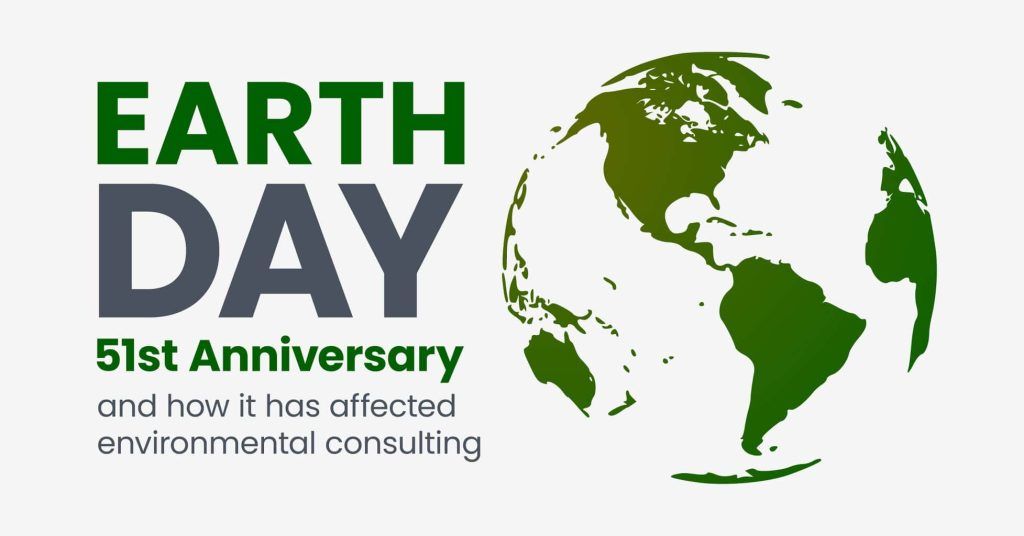How Earth Day Has Impacted Environmental Consulting

How Earth Day Has Impacted Environmental Consulting
April 22, 2021, marks the 51st year of Earth Day. It’s a day that has come to symbolize the environmental movement around the globe. Earth Day has been commemorated since 1970, bringing attention to environmental issues with each year’s anniversary.
The Earth Day initiative has also impacted environmental, health, and safety (EHS) consulting. Sometimes EHS even gets designated with an additional “S” for sustainability, an increasingly important issue for organizations and businesses in various industries.
As we look to Earth Day this year, let’s dive into its history and how it continues to impact EHS professionals, EPA consultants, air quality consultants and environmental compliance services today.
How Earth Day Was Formed
According to EarthDay.org , the official Earth Day website, author and marine biologist Rachel Carson’s 1962 environmental science book “Silent Spring” significantly spread awareness for the environment and living organisms. The book documented the effects of the use of pesticides and covered air, land and water topics that inspired the development of key environmental legislation.
After the book’s release and rising popularity, the first Earth Day in 1970 was designed to be a “teach-in” among college campuses. Organized by Senator Gaylord Nelson, his co-chair Congressman Pete McCloskey and activist Denis Hayes, the group promoted nationwide events under the “Earth Day” title. The event attracted 20 million American participants to demonstrate against industrial development that caused serious environmental and health impacts.
Earth Day events continued to grow each year. In 1990, a group of environmental leaders approached Hayes to organize a global Earth Day celebration. It drew involvement from 200 million people in 141 countries.
In 1992, the United Nations hosted an Earth Summit in Rio de Janeiro, Brazil. The summit was a global conference whose attendees including scientists, political leaders, diplomats and non-governmental organizations from 179 countries. The conference produced a broad agenda for international action on environmental issues.
Earth Day events including demonstrations and educational summits continue every year on April 22. Today, they engage more than 1 billion people in 193 countries.
Earth Day is recognized as the largest secular observance in the world. Nelson received the Presidential Medal of Freedom in 1995 for his efforts in creating the event.
How Earth Day Impacted Environmental Legislation
The inaugural Earth Day is credited with the formation of the U.S. Environmental Protection Agency (EPA) on December 2, 1970. The EPA was tasked with:
- Researching pollutants and their impact on the environment
- Monitoring the biological and physical condition of the environment
- Establishing quantitative “environmental baselines”
- Setting and enforcing standards for individual pollutants and for water and air quality compliance
- Providing consistent standards for avoiding environmental damage and fixing waste disposal problems
Since the creation of Earth Day and the EPA, several environmental laws have been passed. You’re probably most familiar with the Occupational Safety and Health Act of 1970 , designed to ensure healthful and safe working conditions for employees.
Other environmental legislation impacting the EHS field includes:
- Clean Air Act of 1970 : regulates air emissions from moving and stationary sources
- Clean Water Act of 1972 : regulates quality standards for surface waters and discharges of pollutants into U.S. waters
- National Environmental Education Act of 1990 : requires the EPA to provide national leadership to increase environmental literacy
- Federal Insecticide, Fungicide and Rodenticide Act of 1996 : provides federal regulation of pesticide use, sale and distribution
The EPA continues to play a big role in EHS(S), regulating business operations like waste management. The Occupational Safety and Health Administration (OSHA) works closely with the EPA to ensure worker health and safety. Both conduct inspections, audits, investigations and enforcement to protect workers and the environment.
Earth Day’s Impacts on EHS Consulting Today
In 2021 and beyond, expect to see Earth Day continuing to impact EHS consulting and best practices. With the new administration, the EPA is already evolving. In January 2021, the new administration released an executive order to tackle the climate crisis , including placing the climate crisis at the center of U.S. national security and foreign policy. In March 2021, the EPA re-established its climate change website , providing information covering greenhouse gas emissions data, scientific reports and climate change impacts.
What do developments like these mean for EHS? We predict:
- The new administration will likely make changes to various current EPA rules, which may impact EHS for organizations.
- As environmental justice becomes more important to stakeholders and customers, businesses will also become more sustainable to stay competitive. In 2020, an IBM report declared “sustainability has reached a tipping point,” with nearly 60% of consumers willing to change their shopping habits to reduce environmental impact and 80% saying sustainability was important to them.
- There will be more action on the EPA’s Per- and Polyfluoroalkyl Substances (PFAS) Action Plan, impacting regulation of the use of PFAS for businesses.
As society become more sustainability-minded, we expect more organizations to place a greater emphasis on sustainability in their operations. EHS professionals will continue to specialize in the environmental aspect of health and safety to help businesses correct problems and be more sustainable.
Need Environmental Consulting? Contact YellowBird today.
If your business wants to identify and fix any potential safety hazards to the environment, contact YellowBird for on-demand EHS services. Not only does environmental consulting help you operate within EPA regulations, it also can save you money when you transition to more environmentally-friendly practices.
Learn about YellowBird’s Environmental Compliance Services , including Air Quality Compliance Services and Asbestos Compliance Services.


